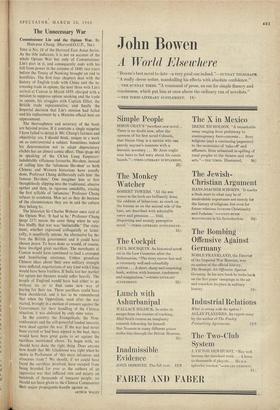The Unnecessary War
Commissioner Lin and the Opium War. By Hsin-pao Chang. (Harvard/O.U.P., 56s.) THIS is No. 18 of the Harvard East Asian Series. As the title indicates, it is not an account of the whole Opium War but only of Commissioner Lin's part in it, and consequently ends with his fall from power in the autumn of 1840, two years before the Treaty of Nanking brought an end to hostilities. The first four chapters deal with the history of English trade with China and the in- creasing trade in opium; the next three with Lin's arrival at Canton in March 1839, charged with a mission to suppress opium smoking and the trade in .opium, his struggles with Captain Elliot, the British trade representative, and finally the Imperial decision that Lin's mission had failed and his replacement by a Manchu official bent on appeasement.
The thoroughness and accuracy of the book are beyond praise. If it contains a single misprint I have failed to detect it. Mr. Chang's fairness and objectivity are, I should think, unique in a work on so controversial a subject. Sometimes indeed his determination not to adapt depreciatory cliches has an almost comic effect. Thus (page 46) in speaking of the Ch'ien Lung Emperors' indubitably villainous favourite, Ho-shen, instead of calling him the 'infamous Ho-shen' as both Chinese and Western .historians have usually done, Professor Chang deliberately calls him 'the famous Ho-shen.' One imagines him at first thoughtlessly slipping into the traditional, abusive epithet and then, in rigorous amiability, erasing the first syllable of 'infamous.' Professor Chang refuses to condemn. Men act as they do because of the circumstances they are in and the culture they belong to.
The historian Sir Charles Webster once said of the Opium War, 'It had to be.' Professor Chang (page 217) means the same thing when he says less bluffly that war was 'ineluctable.' The state- ment, whether expressed colloquially or latini- cally, is manifestly untrue. An alternative lay be- fore the British government and it could have chosen peace. To have done so would, of course, have involved great sacrifices. The merchants at Canton would have continued to lead a cramped and humiliating existence. Unless grandiose Chinese ideas about their own military strength were deflated, negotiations of any kind with China would have been fruitless. If India lost her market for opium her finances would Suffer heavily. The
people of England would have had either to go without tea or to find some new way of paying for their tea. These sacrifices could have been shouldered, and it has to be remembered that when the Opposition, soon after the war started, brought in a motion of censure against the Government for their handling of the Chinese situation, it was defeated by only mine votes.
In the country the Evangelicals, the Non- conformists and the still-powerful landed interests Were dead against the war. If the war had never been started or had been nipped in the bud, there would have been great gains to set against the sacrifices mentioned above. To begin with, we should have done the right thing. Does anyone now doubt that Mr. Gladstone was right when he spoke in Parliament of 'this most infamous and atrocious trade'? We, should, if we could have faced the sacrifices involved, have escaped from being branded for ever as the authors of an aggressive war that inflicted ruin and misery on hundreds of thousands of innocent people; we should not have given to the Chinese Communists their major propaganda-handle against us.
ARTHUR WALEY














































 Previous page
Previous page